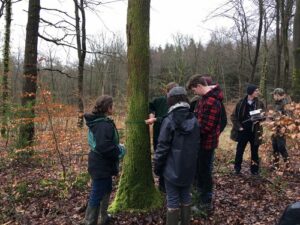This week, scientists from Forest Research have been demonstrating their research on woodlands and climate change at Forestry England’s Alice Holt Forest. The activities are part of British Science Week and have been carried out with local college students studying biology and countryside management.
The students learned about how changes to our climate, such as hotter drier summers, are likely to impact on trees and woodlands in the south-east of England, and the importance of taking actions now to enable our trees and woodlands to thrive in the future.
Working with Forestry England, Forest Research have established three climate change ‘demonstration areas’ where adjustments have been made to the management of the woodland to try to help the trees cope with the changing environmental conditions.

The students visited one of the demonstration areas known as ‘Willows Green’. Here there is concern that the beech woodland may suffer in the hotter, drier summers we are likely to experience more frequently.
The students heard how after removing some of the beech trees as part of planned forest management, Forestry England replaced them with oak trees grown from native English seed sources and from seed sources further south in Europe. The more southerly seed sources have a climate similar to the one Alice Holt Forest is expected to have in the future.
The students learned how to measure the growth of trees using girth bands and had an opportunity to make their own girth bands on some of the mature beech trees in the demonstration area. Dr Gail Atkinson, the project lead explained:
“We will be monitoring the trees to find out more about how the trees from different seed sources cope with the changes in our climate. There may be positive impacts such as improved growth and survival or negative impacts like more damage from a late spring frost or pest outbreak. We will also be looking at how the growth of the newly planted trees compares to the growth of naturally regenerating beech trees beneath the mature beech woodland.”
Willows Green is part of the Alice Holt Climate Change Adaptation Trail which starts a few minutes’ drive from the Alice Holt Forest Visitor Centre in Alice Holt Arboretum Car Park.
Planting woodland adjacent to established woodland or in large clumps is more likely to boost bird populations than random planting, modelling suggests.

Forest Research has announced that Dr Bianca Ambrose-Oji, currently Head of its Society and Environment Research Group, will succeed Professor Chris Quine FRSE as Chief Scientist from June 2025.
England’s non-woodland trees have been mapped for the first time, revealing these trees make up nearly one third of our nation’s tree cover.
Planting woodland adjacent to established woodland or in large clumps is more likely to boost bird populations than random planting, modelling suggests.

Forest Research has announced that Dr Bianca Ambrose-Oji, currently Head of its Society and Environment Research Group, will succeed Professor Chris Quine FRSE as Chief Scientist from June 2025.
England’s non-woodland trees have been mapped for the first time, revealing these trees make up nearly one third of our nation’s tree cover.